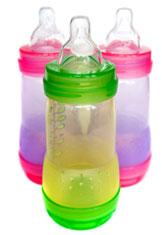The Nurse's Guide to Safe Plastics: 5 Ways to Avoid BPA and Other Harmful Chemicals

Labor and Delivery registered nurses know this better than anyone: if new moms need to use a bottle, the best choice is to avoid plastics and opt for glass bottles or containers that are free of BPA, marketed as "BPA-free". Bisphenol-A (BPA) imitates the sex hormone estrogen and is found in more than just baby bottles and sippy cups. Many plastic food storage containers, even the lining of soda cans contain trace amounts.
The health concerns surrounding BPA include early onset of puberty, cardiovascular problems, hyperactivity and other illnesses that make us think twice about what we’re drinking and eating from. While some exposure to BPA is inevitable, it can be greatly reduced by taking precautions. See the Center for Disease Control’s (CDC) fact sheet to learn everything there is to know about BPA.
50 States Staffing offers 5 tips for reducing exposure that our health professionals can also share with their patients:
- Tip 1: Be aware of more than just BPA. Polyvinyl Chloride (PVC or vinyl), Polystyrene (PS), Polycarbonate (or "other" resins) should also be avoided. These chemicals are found in cling wrap as well as plastic containers. Limit use of cling wrap, and DO NOT use it in the microwave. Foods packaged in cling-wrap (i.e. cheeses and meats) should, ideally, be trimmed of their outermost layers before eating.
- Tip 2: Look at the recycling #s on the bottoms of your plastic containers. Those marked with label No. 7 may contain BPA. In their “Smart Plastics Guide”, the Institute for Agriculture and Trade Policy recommends using food and drink containers that bare the recycling numbers of 4, 5, 1 and 2.
- Tip 3: Don’t drink hot beverages from plastic cups! Microwaving plastic containers or pouring hot liquids into them increases the amount of BPA 55 times faster than when used cold. Swap out that plastic coffee mug and replace it with a glass or ceramic one; the same goes for all your plastic dishes and cups—it’s best to replace them with glass varieties.
- Tip 4: If you own plastic cutlery, cups and dishes, skip the dishwasher and harsh detergents. Opt for hand washing your dishes in warm water, with non-toxic cleaning products such as “Seventh Generation”.
- Tip 5: Go BPA-free at the grocery store: This means limiting canned foods and drinks, as the lining may contain BPA. Cut back on bottled water and filter your own using a reverse osmosis filter, like the Brita Pitcher. This handy link on BPA in kitchen products can help the next time you shop.
Has Your Healthcare Employer Joined the Conversation on Safe Plastics?
Plenty of renowned hospitals have conducted studies on BPA safety levels, and have joined a fray of medical experts that believe these should be reviewed after a number of recent studies on the subject were published. Share your knowledge on this subject by leaving a comment, or joining the conversation on 50 States Staffing’s Facebook and Twitter pages.
Footnote: Travel nurses with an interest in going BPA-free can click here for a Smart Plastics Guide.
